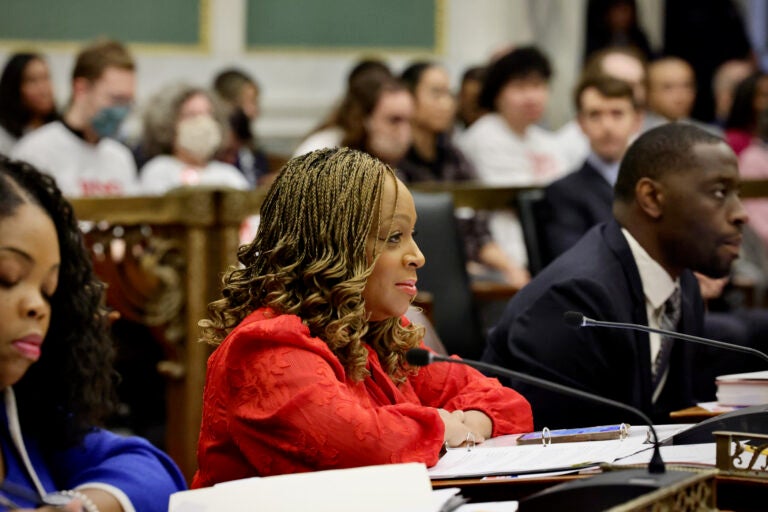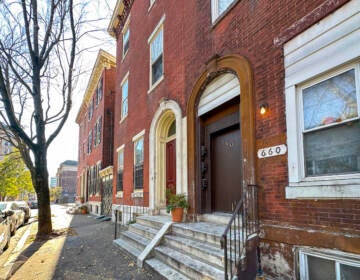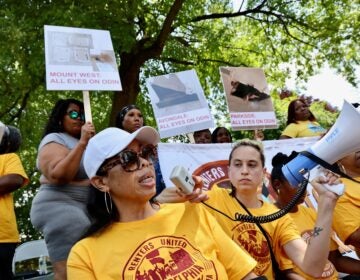Philly City Council advances legislation requiring eviction contractors to carry licenses
The bill was introduced following a string of violent incidents involving deputy landlord-tenant officers last year.

Philadelphia City Councilmember Jamie Gauthier. (Emma Lee/WHYY)
Have a question about Philly’s neighborhoods or the systems that shape them? PlanPhilly reporters want to hear from you! Ask us a question or send us a story idea you think we should cover.
For the first time, private contractors who carry out evictions in Philadelphia may need a city license to perform court-ordered lockouts.
City Council on Wednesday advanced legislation that would require contractors with the Landlord and Tenant Office to complete 189 hours of training to serve the for-profit entity, handling the majority of city evictions.
Under the “Angel Davis Eviction Accountability Bill,” contractors cannot renew their license if they were involved in a violent incident or used force during an eviction in the year prior to reapplying.
“Requiring private contractors who perform lockouts to receive a license from the city would bring accountability to a public function that has proven itself to operate dangerously without oversight,” said Councilmember Jamie Gauthier during a hearing before Council’s Committee on Housing, Neighborhood Development and the Homeless.
A spokesperson for the Landlord and Tenant Office did not immediately respond to a request for comment.
The LTO came under fire last year following a string of shootings by deputy landlord-tenant officers. Two of the incidents landed tenants in the hospital. Angel Davis, who was shot in the head during an attempted lockout at a North Philadelphia apartment complex, was hospitalized in critical condition and continues to recover from a traumatic brain injury.
The shootings sparked renewed calls from elected officials and housing advocates to reform the office amid an ongoing affordable housing crisis. The bill, introduced by Councilmember Kendra Brooks, was the first legislative response at the city level.
“These incidents of violence are not an exception to the rule. They are the outcome of an unjust unaccountable system that routinely endangers the lives of Black women and their children, as well as our seniors, people with disabilities and other people who live on fixed incomes in a time of skyrocketing rents,” said Brooks.
If passed, landlord-tenant officers would have to be trained in cultural diversity, crisis intervention, firearm basics, first aid, ethics and other areas.
Deputies will also have to display their license when performing lockouts and they will need to have liability insurance of $2 million per incident and $4 million per year.
The licenses would be enforced by the Department of Licenses and Inspections or “such other agency as the Mayor may designate,” according to the bill. The legislation includes a nine-month compliance period before licenses will be required.
The bill must now pass the full Council.
It’s unclear if Mayor Cherelle Parker will sign the bill.
Attorney Bethany Nikitenko, a lawyer representing Davis, said she hopes the bill will help make the lockout process safer for tenants such as her client, who is suing the LTO for negligence. She said requiring deputies to have liability insurance is critical in cases where things turn violent.
“The insurance requirement will prevent the victim of a violent eviction from becoming a public charge dependent upon taxpayers to pay for hundreds of the thousands of dollars in hospital bills and medical and therapy services made necessary by the unreasonable conduct of a private for-profit eviction officer,” said Nikitenko.
Brooks’ measure is supported by a veto-proof majority of Council. It moves forward nearly a year after the LTO resumed operations with new procedures and protocols for performing evictions. For example, landlords are now required to submit a safety affidavit before scheduling an eviction. Additionally, tenants can now find out the date and time of their lockout if they call the office.
Last July, Marisa Shuter, Philadelphia’s landlord-tenant officer, agreed to temporarily stop performing evictions after a deputy landlord-tenant officer shot Latese Bethea in the right leg during a lockout in Kensington. It was the third time in four months that a landlord-tenant officer had fired a gun on the job.
During Wednesday’s hearing, Sarah Adamo, legislative affairs manager for the Department of Licenses and Inspections, raised concerns about implementation and enforcement. She said her department, which issues other city licenses, lacks the resources and the expertise to implement the mandates. The bill, she added, falls outside of the department’s “core mission.”
“While the administration is supportive of the spirit of this legislation and sympathetic to the events that precipitated this discussion, we believe that the Department of Licenses and Inspections is not the appropriate department to enforce such legislation,” said Adamo.
It’s unclear how many deputy landlord-tenant officers currently perform lockouts for the LTO.

Subscribe to PlanPhilly
WHYY is your source for fact-based, in-depth journalism and information. As a nonprofit organization, we rely on financial support from readers like you. Please give today.









